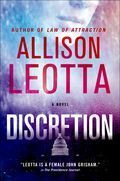Author R&R with Allison Leotta
 Throughout the year, IRTM's "Author R&R" (Reference and Research) feature has profiled authors giving insights on how they conduct research for their novels, with some varied and interesting responses. (You can find them in the Authors section of this blog, here.) Today, it's the turn of former federal prosecutor Allison Leotta, whose new novel, Deception, follows Assistant U.S. Attorney Anna Curtis and her investigation into a murder linked to a Congressman and a high-end escort service.
Throughout the year, IRTM's "Author R&R" (Reference and Research) feature has profiled authors giving insights on how they conduct research for their novels, with some varied and interesting responses. (You can find them in the Authors section of this blog, here.) Today, it's the turn of former federal prosecutor Allison Leotta, whose new novel, Deception, follows Assistant U.S. Attorney Anna Curtis and her investigation into a murder linked to a Congressman and a high-end escort service.
Leotta obviously doesn't have to dig too deep into the research well to find material for her books and to get the details just right, but she passed along some hints that may help others:
"For twelve years, I was a
federal prosecutor in D.C., where I specialized in sex crimes and domestic
violence. I now write novels about –
surprise! – a fictional prosecutor in D.C. who specializes in sex crimes and domestic
violence. I find inspiration for my
plots from the real cases I handled, and I use details drawn from the most
fascinating things I’ve seen.  My most recent book, Discretion,
My most recent book, Discretion,
is about a political sex scandal and murder investigation that ensues after a
high-priced escort is killed in a congressman’s Capitol hideaway. I based many of the details on the real “D.C.
Madam” case and New York’s “Millionaire Madam.”
You can make your story sparkle with authentic details even
if you’ve never made a closing argument or walked a beat. Here’s how:
1. Enroll in a Citizens Police Academy.
Many police stations have whole seminars devoted to teaching
citizens about police methods for
solving and preventing crime. My
local police station here in Montgomery County, MD, has a whole 18-week
course. Check with your local
police stations to see what they offer.
2. Tour your local police facility.
Even if they don’t have a Citizens Police Academy, many
police stations offer the public the opportunity to visit the station and tour
the facilities. Some even offer tours of
the coroner’s office or crime lab. You’ll see the kind of details you simply cannot get anywhere else.
3. Do a ride-along.
Many police stations will allow you to sit in a marked
cruiser while a patrol officer does his shift.
Watch and ask questions. This is
a wealth of how-to information. Follow
up with a thank-you note to the officer (even better: cookies), and you may
have a police source for the rest of your life.
4. Visit a courthouse, watch a trial.
Trials are public, and they can be good entertainment in
addition to a wealth of information. Go
for a specific trial, or simply poke your head into a bunch of different
courtrooms. Each one will have its own
ambiance. Some courtrooms are cattle
calls of a dozen misdemeanor cases, while others may be holding a major
homicide trial or a multi-defendant federal racketeering case. You’ll get a sense for how lawyers ask
questions, how witnesses answer, and how the courtroom feels.
5. Check your terms.
Are your fictional lawyers in District Court, Circuit Court,
or Superior Court? In New York, the main trial court is confusingly called the
Supreme Court, while highest court is the Court of Appeals. A writer unsure of terminology can call the
court, check its website, or consult the National Center for State Courts
website (www.ncsconline.org), which
lists the structure and names of all state courts. Another trick: call a law
professor in the story state.
6. Read the local papers.
Once you’ve chosen the jurisdiction where your story is set,
read the local papers for that area. You’ll quickly get a sense of the terminology for that
jurisdiction. The stories also reveal
local quirks that give a story a sense of place and realism.
7. Check out books on criminal law.
An excellent book on getting the legal details right is
Leslie Budewitz’s Books, Crooks &Counselors: How to Write Accurately About Criminal Law and
Courtroom Procedure. It won an Agatha
last year and is a thoughtful, easy-to-understand how-to manual.
8. Walk your city.
Go behind the scenes, beyond the parts you’d see on a bus
tour. Touch the pavement and see the streets you’re writing about. Visit the real places where your scenes are
set. Ask for a tour of places where you
might set scenes. When organizations
hear that you’re a novelist, they’re often happy to chat with you and get the
free publicity.
9. Talk to people.
Know a lawyer or police officer? Ask her about your scene. Don’t know one? Most police stations have a public relations
branch that will put you in touch with someone who can answer your
questions. Most cops and prosecutors
love telling war stories. Be respectful,
ask questions, follow up with thankful emails. You may find you have more stories than you can use.
Also, strike up conversations with people you wouldn’t
normally chat with. That guy with the
pierced nose and mohawk has a different take on life than you. Talk, ask questions, really listen to the
answers. Get to know where he’s coming
from, and what makes him tick. Then use what you’ve learned to create your
characters and make them real.
10. Use the Internet
There’s nothing like the experience of actually being in the
real place you’re writing about. But if
you just can’t make it there, you can find information online covering topics
including police terminology, forensics, government sites, and guns. Here are a couple sites that have a great
database listing lots of different sources:
Internet Research Resources for Mystery and Crime Writers
The Blood-Red Pencil: Exploring Web Resources for Crime
Good luck and have fun!"








